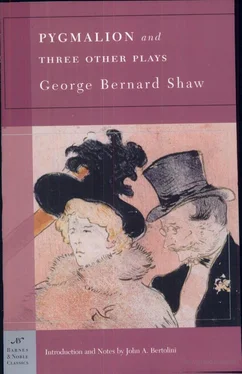HIGGINS Pickering: this chap has a certain natural gift of rhetoric. Observe the rhythm of his native woodnotes wild. {51} 51 7 (p. 399) “his native woodnotes wild”: English poet John Milton (1608-1674) refers thus to Shakespeare in his poem “L‘Allegro” (line 134) in order to distinguish his own art as sophisticated and premeditated from Shakespeare’s spontaneous products of the imagination. Shaw made a similar distinction between himself and Shakespeare, whom he considered to be the master of word music, but poor in ideas. By recalling Milton’s lines here Shaw makes Higgins, the figurative version of himself, a Miltonist; like Milton, Shaw was anxious about his own originality in comparison to Shakespeare. Milton and his creation Satan (in Paradise Lost) and Shaw and his creation Higgins all want to be the authors of themselves.
“I’m willing to tell you: I’m wanting to tell you: I’m waiting to tell you.” Sentimental rhetoric! thats the Welsh strain in him. It also accounts for his mendacity and dishonesty.
PICKERING Oh, please, Higgins: I’m west country myself. [To DOOLITTLE] How did you know the girl was here if you didnt send her?
DOOLITTLE It was like this, Governor. The girl took a boy in the taxi to give him a jaunt. Son of her landlady, he is. He hung about on the chance of her giving him another ride home. Well, she sent him back for her luggage when she heard you was willing for her to stop here. I met the boy at the corner of Long Acre and Endell Street.
HIGGINS Public house. Yes?
DOOLITTLE The poor man’s club, Governor: why shouldnt I?
PICKERING Do let him tell his story, Higgins.
DOOLITTLE He told me what was up. And I ask you, what was my feelings and my duty as a father? I says to the boy, “You bring me the luggage, »I says —
PICKERING Why didnt you go for it yourself?
DOOLITTLE Landlady wouldnt have trusted me with it, Governor. Shes that kind of woman: you know. I had to give the boy a penny afore he trusted me with it, the little swine. I brought it to her just to oblige you like, and make myself agreeable. Thats all.
HIGGINS How much luggage?
DOOLITTLE Musical instrument, Governor. A few pictures, a trifle of jewelry, and a bird-cage. She said she didnt want no clothes. What was I to think from that, Governor? I ask you as a parent what was I to think?
HIGGINS So you came to rescue her from worse than death, eh?
DOOLITTLE [ appreciatively: relieved at being so well understood ] Just so, Governor. Thats right.
PICKERING But why did you bring her luggage if you intended to take her away?
DOOLITTLE Have I said a word about taking her away? Have I now?
HIGGINS [ determinedly ] Youre going to take her away, double quick. [ He crosses to the hearth and rings the bell ].
DOOLITTLE [ rising ] No, Governor. Dont say that. I’m not the man to stand in my girl’s light. Heres a career opening for her, as you might say; and —
MRS. PEARCE opens the door and awaits orders.
HIGGINS Mrs. Pearce: this is Eliza’s father. He has come to take her away. Give her to him. [He goes back to the piano, with an air of washing his hands of the whole affair ] .
DOOLITTLE No. This is a misunderstanding. Listen here —
MRS. PEARCE He cant take her away, Mr. Higgins: how can he?You told me to burn her clothes.
DOOLITTLE Thats right. I cant carry the girl through the streets like a blooming monkey, can I? I put it to you.
HIGGINS You have put it to me that you want your daughter. Take your daughter. If she has no clothes go out and buy her some.
DOOLITTLE [ desperate ] Wheres the clothes she come in? Did I burn them or did your missus here?
MRS. PEARCE I am the housekeeper, if you please. I have sent for some clothes for your girl. When they come you can take her away. You can wait in the kitchen. This way, please.
DOOLITTLE, much troubled; accompanies her to the door; then hesitates; finally turns confidentially to HIGGINS.
DOOLITTLE Listen here, Governor.You and me is men of the world, aint we?
HIGGINS Oh! Men of the world, are we?Youd better go, Mrs. Pearce.
MRS. PEARCE I think so, indeed, sir. [ She goes, with dignity ].
PICKERING The floor is yours, Mr. Doolittle.
DOOLITTLE [to PICKERING] I thank you, Governor.
[ To HIGGINS, who takes refuge on the piano bench, a little overwhelmed by the proximity of his visitor; for DOOLITTLE has a professional, flavor of dust about him ] . Well, the truth is, Ive taken a sort of fancy to you, Governor; and if you want the girl, I’m not so set on having her back home again but what I might be open to an arrangement. Regarded in the light of a young woman, shes a fine handsome girl. As a daughter shes not worth her keep; and so I tell you straight. All I ask is my rights as a father; and youre the last man alive to expect me to let her go for nothing; for I can see youre one of the straight sort, Governor. Well, whats a five pound note to you? And whats Eliza to me? [He returns to his chair and sits down judicially].
PICKERING I think you ought to know, Doolittle, that Mr. Higgins’s intentions are entirely honorable.
DOOLITTLE Course they are, Governor. If I thought they wasnt, Id ask fifty.
HIGGINS [revolted] Do you mean to say, you callous rascal, that you would sell your daughter for £50?
DOOLITTLE Not in a general way I wouldnt; but to oblige a gentleman like you I’d do a good deal, I do assure you.
PICKERING Have you no morals, man?
DOOLITTLE [unabashed] Cant afford them, Governor. Neither could you if you was as poor as me. Not that I mean any harm, you know. But if Liza is going to have a bit out of this, why not me too?
HIGGINS [troubled] I dont know what to do, Pickering. There can be no question that as a matter of morals it’s a positive crime to give this chap a farthing. And yet I feel a sort of rough justice in his claim.
DOOLITTLE Thats it, Governor. Thats all I say. A father’s heart, as it were.
PICKERING Well, I know the feeling; but really it seems hardly right —
DOOLITTLE Dont say that, Governor. Dont look at it that way. What am I, Governors both? I ask you, what am I? I’m one of the undeserving poor: thats what I am. Think of what that means to a man. It means that hes up agen middle class morality all the time. If theres anything going, and I put in for a bit of it, it’s always the same story: “Youre undeserving; so you cant have it.” But my needs is as great as the most deserving widow’s that ever got money out of six different charities in one week for the death of the same husband. I dont need less than a deserving man: I need more. I dont eat less hearty than him; and I drink a lot more. I want a bit of amusement, cause I’m a thinking man. I want cheerfulness and a song and a band when I feel low. Well, they charge me just the same for everything as they charge the deserving. What is middle class morality? Just an excuse for never giving me anything. Therefore, I ask you, as two gentlemen, not to play that game on me. I’m playing straight with you. I aint pretending to be deserving. I’m undeserving; and I mean to go on being undeserving. I like it; and thats the truth. Will you take advantage of a man’s nature to do him out of the price of his own daughter what hes brought up and fed and clothed by the sweat of his brow until shes growed big enough to be interesting to you two gentlemen? Is five pounds unreasonable? I put it to you; and I leave it to you.
HIGGINS [ rising, and going over to PICKERING ] Pickering: if we were to take this man in hand for three months, he could choose between a seat in the Cabinet and a popular pulpit in Wales.
Читать дальше












